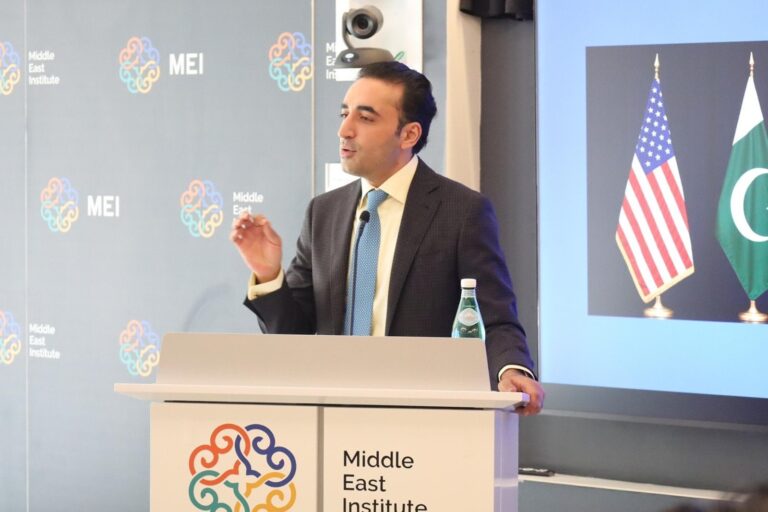PPP Chairman and former foreign minister Bilawal Bhutto-Zardari on Thursday warned that cutting off Pakistan’s water supply would be tantamount to an act of war, cautioning that New Delhi’s actions risk laying the groundwork for the world’s first nuclear water conflict.
Speaking at the Middle East Institute in Washington, Bilawal said that Prime Minister Shehbaz Sharif had constituted a delegation with a clear mission: to seek peace through dialogue and diplomacy with India. “You might ask why we are here in Washington and not speaking to our adversary… they refuse to talk,” he said, pointing to India’s persistent unwillingness to engage.
Bilawal, who is leading a multi-party delegation to world capitals, is presenting Pakistan’s stance on the recent escalation with India, which brought the two nuclear-armed neighbours to the brink of full-scale war. The crisis intensified after India launched strikes inside Pakistan, prompting a swift and proportionate response targeting Indian military installations, before a ceasefire was reached on May 10.
Read more: South Asia at brink over Kashmir and Indus Water Treaty, Bilawal warns US lawmakers
Although the violence has subsided since the ceasefire announcement, India’s actions, particularly regarding Pakistan’s water rights, remain a point of contention and continue to fuel the hostility between the two nations.
The PPP chairman in his address, emphasised that while Pakistan is open to new arrangements, agreements, and even treaties with India, progress can only be made if India first honours its existing commitments. “If our dialogue and diplomacy in pursuit of peace are to be successful… then surely they must first abide by the old treaties and take back their decision, vis-a-vis the Indus Water Treaty,” he said.
He criticised the Indian government’s attitude toward dialogue and cooperation, noting that it had declined Pakistan’s calls for joint investigations into acts of terrorism, rejected former US President Donald Trump’s offer to mediate, and continues to rebuff Pakistan’s overtures.
“India has belligerently refused. They refused cooperation on terror — you saw it. The Prime Minister of Pakistan said let’s have an investigation, they said no. They refuse mediation, they refuse dialogue,” said the PPP chairman.
He warned that such a refusal to engage in diplomacy would only escalate tensions. “All that means is there will be more terrorism, there will be more war, and there will be no peace.”
He added that while the Indian government may be willing to condemn its people to a perpetual state of conflict, Pakistan would not follow suit. “I refuse to damn my people, and I refuse to damn the people of India to this fate.”
Bilawal said this is why the Pakistani delegation would continue travelling “from capital to capital” with a simple and urgent message: “We want peace, and we need your help.”
Bilawal emphasized that the current Indian leadership represents an older generation, yet their actions risk condemning his generation to the same fate of conflict over Kashmir, terrorism, and now, water resources.
He stated, “If you see the delegation from the Indian side, or even just the Indian government… they represent an older generation, but I want to ask them: do they want to damn my generation to the same fate?”
Bilawal highlighted that the Indian government’s threats violate the United Nations Charter and the 1960 Indus Waters Treaty, which has historically governed the distribution of water from the Indus River system between the two nations.
“The Indian government, in violation of the UN Charter, has threatened to cut off the water supply to 240 million Pakistanis,” he said. “Now they are damning my generation, future generations, not only to fight over Kashmir, not only to go to full-out war whenever there is a terrorist attack, but now they are damning the future generations of Indians and Pakistanis to fight over water.”
He expressed his refusal to accept such a fate, stating, “I refuse to damn the people of my country, and I bear no ill will to the people of India. I refuse to damn the youth of India and Pakistan to my children and their children to fight over water, over Kashmir, and over terrorism.”
PPP Chairman emphasized the necessity of dialogue between Pakistan and India to address longstanding issues, particularly Kashmir. He stated: “We have to talk about Kashmir because it’s a root cause of all our trouble but also because if India is serious about combatting terrorism, they have to create a more conducive environment in Kashmir.”
He criticized India’s actions in Kashmir, highlighting the use of force against civilians. He argued that such measures only exacerbate tensions and hinder peace efforts. He further pointed out that India’s approach to the region has implications beyond bilateral relations, affecting regional stability.
Addressing the critical issue of water resources, Bilawal expressed grave concern over India’s recent threats to cut off water supplies to Pakistan. He warned that such actions could lead to severe consequences, including potential nuclear conflict.
“No civilized country can endorse this move, in the age of climate challenges that are to come, water scarcity and water wars are any ways used to be a theory. India shutting off Pakistan’s water supply is laying the foundations for the first nuclear water war. We have said that cutting off our water supply would be an act of war,” Bilawal said. “We don’t say it in a jingoistic manner, we don’t say it with any relish — it is an existential crisis for us.”
Bilawal called on the international community to intervene, urging countries to hold India accountable for violating the Indus Water Treaty. He stressed that allowing such actions would set a dangerous precedent, potentially leading to widespread conflicts over shared water resources.
“Any country on the planet, no matter their size, their strength or their ability, would fight for their survival and fight for their water. India must abide by the Indus Water Treaty,” he concluded.

